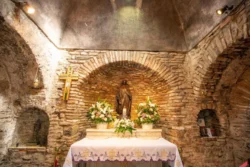
Press Release (ePRNews.com) - Lynnwood, WA (USA) - Dec 10, 2018 (UTC) - When journalist/author Rick Michels set about to write a book on the life of Christ, he knew he was going over well tread ground. An avid reader of scholarly works on the New Testament, Michels figured he’d need to approach the subject from a different angle. When he came upon the mysterious and anonymous “Disciple whom Jesus Loved,” he wondered if the Gospel of John was actually hiding the identity of a vital witness in plain sight.
“As I studied the political and legal ramifications facing the ruling class of Jerusalem over the claims of Jesus as Messiah, I found an intriguing character named Nicodemus – an insider with a foot in two camps. It began to dawn on me that this very enigmatic Pharisee fit many of the clues offered as to whom the ‘Beloved Disciple’ might be,” Michels said.
In his newly released Messianic Men: How Jesus launched his Kingdom and trained the men who conquered Rome, Michels lists a number of potential identifiers that point to Nicodemus for consideration:
“Nicodemus had a need for anonymity. He first approached Jesus in secret. Jesus chided him, but in their dialogue indicated that he – the Son of God – came because ‘God so loved the world.’ It is with Nicodemus that we see Jesus overtly and openly declaring, perhaps for the first time, God’s love for all mankind. As we see Nicodemus’ role in the events of Jesus increase as he nears his death, we see the beloved disciple take a growing role as well,” he explained.
As the theory grew in his mind, Michels was unable to find other scholars who drew the links he drew. “Either I saw something the world had missed for thousands of years, or I had an over active imagination. But at the least, I had a hook to get people to take a serious look at a book written by an amateur scholar but trained journalist,” Michels added, who called Nicodemus the “Deep Throat” of the gospels, drawing a comparison between Watergate and the Trial of Jesus.
“Someone was feeding the writer of John’s gospel inside information on the goings on in the upper chambers of the ruling elites of Jerusalem. Nicodemus is the most likely suspect.
“When the disciples asked Jesus who the betrayer is, Jesus replied ‘It is one of the twelve’,” Michels continued. “So we know there were more than the twelve disciples in the room. Peter motions to the beloved disciple to find out who the betrayer is. Peter is already acting with amazing bravado throughout the dinner. Why would he defer to a fellow member of the twelve to find out from Jesus who the betrayer is when he already considers himself top dog and is willing to confront Jesus regarding just about anything? The disciples begin an argument, each exonerating himself as betrayer. Likely, Peter figures that Jesus isn’t prepared to single out one of the twelve to another member of the twelve. But he may be willing to divulge the person to someone outside the twelve – someone who is not a friendly rival whom he can trust.”
Michels surmises that Jesus divulges the identity to Nicodemus secretly because when Judas leaves to betray him, Jesus knows Nicodemus will need to leave the dinner early as well. As a member of the Jewish ruling body, he cannot be seen during the arrest as an insider to the growing Jesus movement. As it turns out, when Peter followed the arresting party into the High Priest’s courtyard, it is an anonymous person, with access rights to the courtyard who helps him get in. Nicodemus would have that access, as a member of the Sanhedrin. This also indicates a special relationship between Peter and this anonymous person. Similarly, we find a special relationship between Peter and the Beloved Disciple. They race to the tomb together (Nicodemus, having buried Jesus while Peter was sulking over his betrayal, would know the fastest way to the tomb). The two are also together when the resurrected Jesus discloses Peter’s fate as a martyr.
Would Jesus request Nicodemus take care of his mother as he did to the Beloved Disciple? It seems to be a fitting thing to do, Michels suggests, as Nicodemus was a wealthy man with the means to provide Mary a comfortable life.
“Nicodemus, as a member of the ruling class, was safe to be seen as merely friendly and charitable as a good Jew to those fellow Jews understandably intrigued in the growing Jesus movement. He was free to do so long as he acted with integrity toward the legalities of the law and was seen as benefitting a poor widow and the mother of a respected teacher,” Michels explained. “What he could not be seen as is a fellow conspirator of a seeming cabal plotting the overthrow of the ruling system. So, the anonymity the gospel of John provides is quasi. It portrays Nicodemus as a good and righteous man, yet keeping his identity secret when it came to activities within the tightly knit community. Peter confronted openly the legitimacy of the rulers for rejecting Jesus as Messiah during his historic speech on Pentecost. That movement became a kind of insurgency against the legitimacy of the rulers of Jerusalem. So he had to keep his distance.”
In Messianic Men, Michels takes a keen eye to the political ramifications of Jesus of Nazareth, whose movement and claims of authority were a direct threat to those in power in Israel. The power of the Jesus movement, Michels maintains, was in the timing of his advent, the remarkable ability Jesus possessed to cause the Jewish people to interpret his ministry in light of their most sacred writings, and naturally, his amazing skills as a miracle maker and exorcist.
“Those who want to dismiss the miraculous nature of Jesus’ ministry as mythology have to recognize two vital points. First, the gospel accounts are remarkably early source material and there is no evidence these accounts were in any significant way tampered with. These are amazing eyewitness accounts attested to by actual historical persons who Jesus entrusted his movement to. Second, these accounts had to pass the smell test that those who came hundreds to thousands of years later do not have to pass. It is one thing to say, as the gospel of John says, that the trial before Pilate took place as it did. John’s account appeals to living eyewitnesses for evidence of its veracity. We see historical figures like Nicodemus, Lazarus of Bethany, even a high priest servant named Malcus, whose ear Peter cut off during Jesus’ arrest. For scholars to come along hundreds of years later to blithely say these things did not happen is somewhat convenient for them: there is no one around to refute their witness. But the gospel accounts had to stand up to scrutiny by living witnesses.
“Being an avid student of the biblical scholars, I wanted to sort through the arguments, and approach the subject from the viewpoint of a reporter who studies the consensus of the scholar community, views the best available data and sources, and come up with a compelling story of actual events as reported, using the facts at hand. And I had fun with it. It is for real the greatest story ever told.”
Messianic Men is self-published and is available on Amazon.
For more information contact:
Rick Michels, author
Rickmichels82@gmail.com
www.messianicmenbook.com
Source : rick michels



